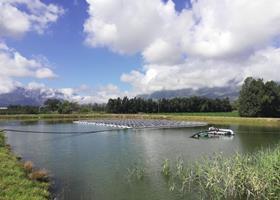
With South Africa’s electricity supply problems continuing amidst corruption inquiries at the country’s electricity supplier, growers are increasingly attempting to source other forms of energy.
In a country where the sun shines more than 300 days a year, harvesting the power of the sun is becoming of great importance.
In the Orange River, and other regions, solar operations are increasingly driving packhouse systems while energy saving initiatives are introduced on many farms. The latest development is that of floating solar PV installations on farm dams.
The first installation of this kind in Africa was recently introduced at Marlenique, a fruit farm outside Franschhoek, one of the industry’s plum and pear regions.
The system has been installed by New South Energy on the farm’s dam, helping to generate clean energy, while also minimising evaporation from dam and, at the same time, saving valuable agricultural land.
The system is the first commercially operated floating solar system on the continent, and at 60kWp, it is also the largest.
The first phase of the project, which also includes a land-based solar installation, will allow the farm to run 90 per cent of its energy intensive cold storage, irrigation and other facilities off the traditional electricity grid.
A second phase, which will see the installation of battery packs, will remove the farm from the electricity grid completely and become self-sufficient as far as electricity is concerned.
At the opening of the facility, the Western Cape’s minister Beverley Schäfer said the project was addressing some of the key sustainability issues facing agriculture and the economy, namely water and energy, in order to find solutions.
“The system reduces the farm’s reliance on the electricity grid, and provides a clean, affordable energy supply, while at the same time also reducing evaporation and saving water,' she outlined. 'The knock-on effect is that the business will save money in the long run, and create a business that is not only environmentally sustainable, but financially sustainable as well.”
Boplaas 1743, which owns and operates the farm, is one of the oldest family owned fruit farming businesses in the country.
Financial director Carl van der Merwe said the installation would reduce its carbon footprint by half: “With rising electricity prices, and uncertainty around Eskom, the family made the decision to invest in solar. Marlenique farm is the highest energy user in our portfolio. We are aiming to be 100 per cent green through solar energy solutions across our entire portfolio in the near future.”






No comments yet